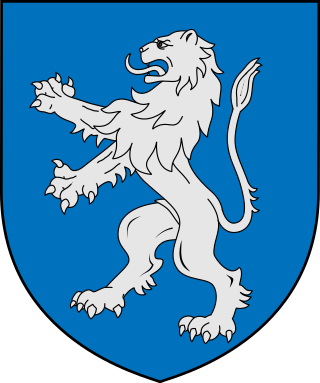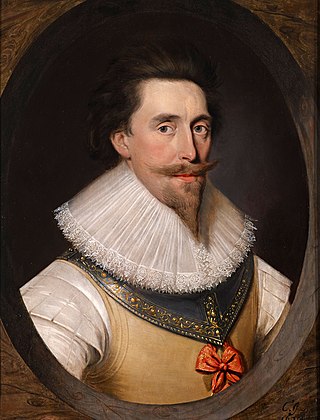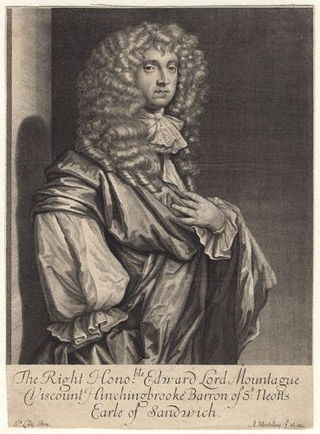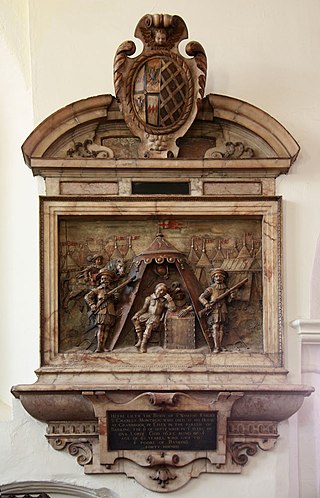
Earl of Sandwich is a noble title in the Peerage of England, held since its creation by the House of Montagu. It is nominally associated with Sandwich, Kent. It was created in 1660 for the prominent naval commander Admiral Sir Edward Montagu. He was made Baron Montagu of St Neots, of St Neots in the County of Huntingdon, and Viscount Hinchingbrooke, at the same time, also in the Peerage of England. The viscountcy is used as the courtesy title by the heir apparent to the earldom. A member of the prominent Montagu family, Lord Sandwich was the son of Sir Sidney Montagu, youngest brother of Henry Montagu, 1st Earl of Manchester, and Edward Montagu, 1st Baron Montagu of Boughton.

Edward Montagu, 1st Earl of Sandwich, KG PC FRS JP was an English military officer, politician and diplomat, who fought for the Parliamentarian army during the First English Civil War and was an MP at various times between 1645 and 1660. A loyal supporter of Oliver Cromwell, he was a member of the English Council of State from 1653 to 1659 and General at sea from 1656 to 1660. Following Cromwell's death in 1658, he switched allegiance and played an important role in the Restoration of Charles II in May 1660.

Baron Crew, of Stene in the County of Northampton, was a title in the Peerage of England. It was created on 20 April 1661 for the politician John Crew. He was the son of Sir Thomas Crewe, Speaker of the House of Commons. Lord Crew was succeeded by his eldest son, the second Baron. He sat as Member of Parliament for Northamptonshire and Brackley. On his death the title passed to his younger brother, the third Baron. He was Bishop of Oxford and Bishop of Durham. The title became extinct on his death in 1721.

Francis Fane, 1st Earl of Westmorland, of Mereworth in Kent and of Apethorpe in Northamptonshire was an English landowner and politician who sat in the House of Commons between 1601 and 1624 and then was raised to the Peerage as Earl of Westmorland.
Sir Anthony Irby was an English politician who sat in the House of Commons at various times between 1628 and 1682.

Sir Gilbert Pickering, 1st Baronet, 10 March 1611 to 17 October 1668, was a member of the landed gentry from Northamptonshire, and a religious Independent who supported Parliament in the Wars of the Three Kingdoms. An MP for Northamptonshire for most of the period from 1640 to 1660, during the 1649 to 1660 Interregnum he also served as Lord Chamberlain, sat on the English Council of State, and was appointed to Cromwell's Upper House in 1658.

Edward Montagu, 2nd Earl of Sandwich was an English aristocrat and politician.
Thomas Hatcher was an English politician who sat in the House of Commons at various times between 1624 and 1659. He fought on the Parliamentary side during the English Civil War.

Sir Thomas Crewe, of Stene, between Farthinghoe and Brackley in Northamptonshire, was an English Member of Parliament and lawyer, and served as Speaker of the House of Commons from 1623 to 1625.
Sir John Pakington, 2nd Baronet of Westwood House, near Droitwich, Worcestershire was an English politician who sat in the House of Commons at various times between 1640 and 1679. He supported the Royalist cause in the English Civil War.

Sir John Curzon, 1st Baronet of Kedleston Hall in Derbyshire was an English politician and landowner who served as an Member of Parliament from 1628 to 1629, then 1640 to 1648. A devout Presbyterian, he supported the Parliamentarian cause during the First English Civil War, but was excluded by Pride's Purge in 1648.
Edmund Dunch, 1st Baron Burnell of East Wittenham (1602–1678) was an English Member of Parliament who supported the Parliamentary cause before and during the English Civil War. During the Interregnum he sat as a member of parliament. In 1659, after the Protectorate and before the Restoration, regaining his seat in the Rump he also sat in Committee of Safety. After the restoration of the monarchy he was not exempted under the Act of Pardon and Oblivion but the titles granted to him under the Protectorate were not recognised under the restored monarchy of Charles II.

Sir Richard Edgcumbe was an English politician.

Sir Sidney Montagu was an English politician who sat in the House of Commons at various times between 1593 and 1642. He supported the Royalist cause in the First English Civil War.

Thomas Crew, 2nd Baron Crew of Steane, Northamptonshire was an English politician who sat in the House of Commons at various times between 1654 and 1679, when he inherited the peerage Baron Crew.
Lewis Watson, 1st Baron Rockingham was an English landowner and politician who sat in the House of Commons from 1621 to 1624. From 1621 to 1645 when he received his peerage he was known as Sir Lewis Watson, 1st Baronet. He supported the Royalist cause in the English Civil War and for his services was created Baron Rockingham in 1645.

Sir Charles Montagu of Cranbrook Hall in the parish of Barking, Essex, was an English politician who sat in the House of Commons from 1614 to 1625.
Sir Edward Spencer was an English landowner, lawyer, knight, nobleman, and politician who sat in the House of Commons at various times between 1621 and 1648.
Sidney Wortley Montagu, of Wortley, Yorkshire and Walcot, Northamptonshire, was a British coal-owner and Whig politician who sat in the English and British House of Commons between 1679 and 1727. He was one of the leading coal owners in the North-East and a member of powerful coal cartels. Although he served in Parliament over a long period, his contributions there were limited.













